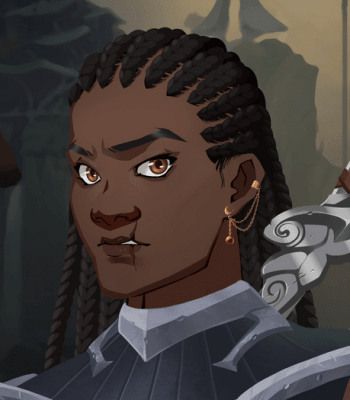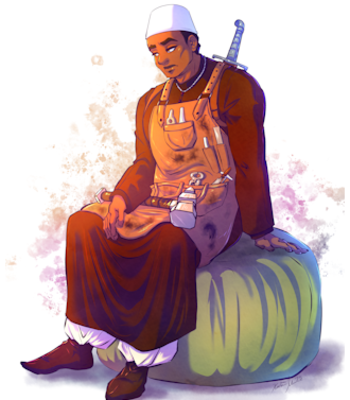Practices related to the dead probably vary pretty widely from place to place and person to person, so I'm not too worried about people making up some of their own small traditions for their own particular people and places. But here are some broader generalities for our setting!
Visiting Graves
Ancient Ruleskan and north Idiri pagan practices strongly encouraged visits to graves, during which family and friends would bring offerings of food and drink as well as the gift of their company. Although souls were believed to reside in the Otherland, it was thought that they nonetheless had a connection to their burial site and could easily be present there. Present-day pagans still believe this and continue to faithfully visit graves during all times of the year, though there are certain periods and days during which visits are especially practiced or encouraged (see further below).
In contrast Azadi more or less discourages people from becoming too involved in graveside visits, as orthodox belief emphasizes that the virtuous dead have moved on to the Eternal Sirdab that lies at the heart of the Otherland, and so should not be considered present at their gravesite. It also discourages the lavish provision of food and drink ala the pagans, and overall condemns superstitions that implicitly suggest that the dead are not truly with Annur.
Nevertheless, cemeteries and graves are still widely considered to be places where the outermost sphere of the Otherland, the Slumberland, is nearer and more accessible, and therefore it is common belief that contact may be made there between those residing in the living world and those who have moved on to the realm of the dead, even to the Eternal Sirdab. So while Azadi orthodoxy encourages people to focus their care and generosity on the living, many people still feel close to their dead and continue to honor them in simple ways.
Days for the Dead
There are certain times of the year when the boundaries between the living world and the Otherland are believed to become weaker or more fluid. The most extended of these times is the month of Kholabi. Another time is the span of dark days in between the winter solstice and the first day of Alkhila. The equinoxes, tipping points between day and night and therefore times of fluctuating boundaries, are another time.
Kholabi 21st, the Day of All Souls Dreaming, is the chief Kalentic day of remembrance for all the dead. This day is recognized by non-Kalentians, but for them is the start of an uneasy period in which the dead are more restless -- dreaming of their former life -- similar to the days after the winter solstice. The initially pagan/Nirzalite festival for the dead is in the lead-up to the winter solstice, and is widely celebrated by all faiths in north Idiri (including in Omrazir).
Speaking of the Dead
Many Azadi do prefer to refrain from speaking the name of the dead for several days or even weeks after their passing, as there is a wish for the deceased not to be "distracted" from their passage through the Otherland to God, or drawn to or held back in the Slumberland by hearing their name. At best this would be detrimental to the deceased, and at worst a soul might be vengeful and destructive if it is held back in any way. Naming the recently dead could also attract the attention of malevolent spirits that could cause harm both to the deceased and the living.
During this time people may speak of their loved one in kinship terms, such as "my mother's sister, Dreamer guide her path," or sometimes still less directly, e.g., "my father's son" for a recently deceased brother. Other appended phrases like "blessed of memory" or "may she dwell in the Song" would also be fitting when referring to the departed, and this is another place where players are definitely free to improvise.
Elestaarians, who strongly believe that souls will be tested as they proceed through the Otherland, most strictly observe the practice of not speaking the name of the dead. Elestaarians will often burn a candle or taper for the soul of a loved one, or, if they cannot afford this themselves, will request that the local fire temple do so on their behalf. The first eleven days and nights after a death are considered the most critical period of time, but many will not speak the deceased's name for a full eleven weeks.
Again, these are common practices but not necessarily universal, and some people may be more or less superstitious than others, and adjust their speech and behavior accordingly.
Speaking TO the Dead
This is something that would likely be pretty individualized. Some people might feel very strongly that their loved ones are with God in the Eternal Sirdab, beyond easy reach of their voice, or else might simply feel little inclination or need to speak with them. Others might feel a strong sentiment that encourages them to continue to speak to the dead as if they were near, whether from love or guilt or a host of other emotional reasons. These people might focus on the gravesite as a passage for communication and contact, and visit them fairly frequently.
If people leave anything at or on a grave it is most likely to be a flower (whose swift wilting signified to the pagans its transition to the realm of the dead, and into the possession of the deceased) or an Azadi prayer stone, but this is again something where players are free to do what seems fitting for their character.
Kalentian Practices
In contrast to both Azadi and to Ruveran Kalentians, Idiri Kalentians have a long and seemingly eradicable tradition of feasting at or, ideally, upon, the tombs of their dead. Many north Idiri tombs are horizontal blocks or slabs of stone that facilitate this practice, and some will even have a small circular depression in their surface into which wine may be poured, or food or other offerings set. These feasts may occur on the Day of All Souls Dreaming, and also on the birthday or saint's day (often the same thing) of the deceased.
Despite this closeness to the departed, Kalentians do not believe that souls of ordinary folk have any intercessory power with Dionos. Only saints have such a capacity, just as only deceased saints may work miracles through their relics or site of interment.
Ruveran Kalentians sing and light candles for the dead on the Day of All Souls Dreaming, and will often light a candle on or in front of a grave for this day, but they do not follow the practice of feasting on a tomb or in the graveyard.
Obviously this is not comprehensive, but I hope it answers some questions (finally)!



